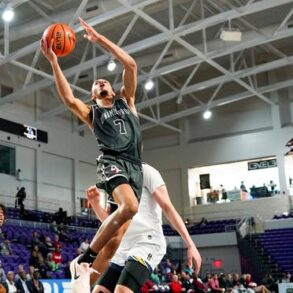When it comes to New Orleans’ basketball legacy, Kerry Kittles’ name stands tall. As a standout at St. Augustine High School, Kittles helped shape the Purple Knights into a dominant force, boasting an impressive 66-5 record over two years. Though the Crescent City was proud to produce top-tier talents like Randy Livingston and Duane Spencer, Kittles threw everyone a curveball—he packed his bags for Villanova instead of staying close to home. At the time, the Wildcats were a program in flux, but Kittles didn’t let uncertainty sway him.
By the time his college career ended, Kerry Kittles had cemented his place among the Wildcats’ elite. He earned back-to-back All-America honors, capping it off in 1996 as Villanova’s first consensus All-American since 1950. Add to that his record-breaking 277 career steals, a Big East Tournament title, and a spot in the Philadelphia Big Five Hall of Fame—Kittles had become a legend in the making.
Kerry Kittles’ short NBA Journey
ADVERTISEMENT
Article continues below this ad
That momentum carried into the 1996 NBA Draft, where the New Jersey Nets claimed him with the 8th overall pick. Kittles didn’t waste a moment, averaging 16.7 points as a rookie, with 158 three-pointers to his name—still a record for NBA rookies and the Nets franchise at the time. And when he dropped 40 points against Milwaukee that same season, the league knew he was no fluke.
But soon, the game took its toll. Knee injuries started to slow him down, leading to four operations in just five years. The 2000–01 season was particularly tough—Kittles was sidelined for the entire year.
Even so, Kittles had plenty of standout moments. Shooting over 40 percent from deep in three separate seasons, he became one of the NBA’s most reliable sharpshooters. With Jason Kidd at the helm, Kittles played a key role in guiding the Nets to back-to-back NBA Finals appearances in 2002 and 2003. But by 2004, the Nets traded him to the Los Angeles Clippers in a money-saving move.

via Getty
ORLANDO, FL -SEPTEMBER 20: (L to R) Marcus Camby, Ray Allen, Stephon Marbury, Kobe Bryant, Shareef Abdur-Rahim, Jermaine O’Neal, Kerry Kittles, Steve Nash, John Wallace, Antoine Walker, and Samaki Walker poses for a portrait during the 1996 NBA Rookie Photo Shoot on September 20, 1996 in Orlando, Florida. NOTE TO USER: User expressly acknowledges and agrees that, by downloading and or using this photograph, User is consenting to the terms and conditions of the Getty Images License Agreement. Mandatory Copyright Notice: Copyright 1996 NBAE (Photo by Nathaniel S. Butler/NBAE via Getty Images)
However, after an injury-plagued season with the Clippers, Kittles decided to step away, leaving behind an impressive legacy: third all-time in Nets history for three-pointers made (687) and steals (803). But Kittles wasn’t done pursuing new challenges.
Post-retirement and Wall Street
After retiring in 2005, he returned to Villanova to earn his MBA, which he completed in 2009. It was a full-circle moment, as Villanova was where his basketball journey truly began. By 2010, Kittles was giving back, serving on Villanova’s President’s Advisory Council, where he mentored students, created professional opportunities, and built key corporate partnerships to help shape future careers.
During this time, Wall Street caught Kittles’ attention. He spent some years in finance, but something didn’t click. “It’s not that it’s bad or good,” Kittles explained about his business career. “It’s just different. I enjoy doing that, as well. It just doesn’t scratch the itch that basketball does for me.”
That basketball itch brought Kittles back to the sidelines. In 2014, after reconnecting with Greg Herenda, head coach at Fairleigh Dickinson, Kittles dipped his toes into coaching. What started as a casual invitation to evaluate players turned into something bigger. Kittles quickly fell in love with the role—breaking down film, analyzing games, and mentoring players. From Wall Street to the court, it was clear where Kittles’ heart truly belonged.
“The more and more I spent time around his program, the more and more I realized that I had a lot of information in my head that I needed to share,” Kittles explained. Whether it was the NBA, college, or high school, he wasn’t picky. It just had to feel right.
Kittles comes back to hoops
ADVERTISEMENT
Article continues below this ad
However, with a wife and five kids to think about, Kittles couldn’t just pack up his family and go anywhere. So, when Princeton’s coaching role opened up, it made perfect sense. A connection through mutual friends helped him get his foot in the door, and once head coach Mitch Henderson called around for references, Kittles’ reputation stood out. Greg Herenda, a long-time supporter, praised him, saying, “He’s not one of these pro guys that just talks about scoring and shooting. He’s into discipline and defense.” That old-school approach proved to be a perfect fit.
From 2016 to 2018, Kittles served as an assistant coach at Princeton, even helping the team win the Ivy League Tournament in 2017. Reflecting on that period, Kittles saw it as a chance to grow. “I always wanted to stay involved in the game,” he said. “When you’re a player and you get into coaching, you see the game in a different way. Mentoring young people to feel more confident in themselves, believing in themselves—that’s what mentoring is always about. It was good.”
Looking back, Kittles cherished his time in mid-major basketball. “I enjoyed most of my experience coaching. It was fun for me to see today’s game and where it’s trending,” he admitted. Coaching not only gave him perspective, but also helped him learn the ropes of recruiting and development.
ADVERTISEMENT
Article continues below this ad
“It was good for me at that moment in my life, and I’m looking forward to the next adventure.”
Despite an up-and-down NBA career marked by injuries, Kittles’ name still holds weight, especially in college basketball. At Villanova, where his legacy started, his influence remains undeniable.
This post was originally published on this site be sure to check out more of their content.





